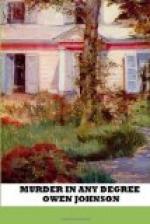“Shakspere is the curse of the English drama,” he would declare, with a descending gesture which caused all the little glasses to rattle their alarm. “Nothing will ever come out of England until his influence is discounted. He was a primitive, a Preraphaelite. He understood nothing of form, of composition. He was a poet who wandered into the drama as a sheep strays into the pasture of the bulls, a colorist who imagines he can be a sculptor. The influence of Victoria sentimentalized the whole artistic movement in England, made it bourgeois, and flavored it with mint sauce. Modern portraiture has turned the galleries into an exhibition of wax works. What is wrong with painting to-day—do you know?”
“Allons, tell us!” cried two or three, while others, availing themselves of the breathing space, filled the air with their orders:
“Paul, another bock.”
“Two hard-boiled eggs.”
“And pretzels; don’t forget the pretzels.”
“The trouble with painting to-day is that it has no point of view,” cried Rantoul, swallowing an egg in the anaconda fashion. “We are interpreting life in the manner of the Middle Ages. We forget art should be historical. We forget that we are now in our century. Ugliness, not beauty, is the note of our century; turbulence, strife, materialism, the mob, machinery, masses, not units. Why paint a captain of industry against a Francois I tapestry? Paint him at his desk. The desk is a throne; interpret it. We are ruled by mobs. Who paints mobs? What is wrong is this, that art is in the bondage of literature—sentimentality. We must record what we experience. Ugliness has its utility, its magnetism; the ugliness of abject misery moves you to think, to readjust ideas. We must be rebels, we young men. Ah, if we could only burn the galleries, we should be forced to return to life.”
“Bravo, Rantoul!”
“Right, old chap.”
“Smash the statues!”
“Burn the galleries!”
“Down with tradition!”
“Eggs and more bock!”
But where Rantoul differed from the revolutionary regiment was that he was not simply a painter who delivered orations; he could paint. His tirades were not a furore of denunciation so much as they were the impulsive chafing of the creative energy within him. In the school he was already a marked man to set the prophets prophesying. He had a style of his own, biting, incisive, overloaded and excessive, but with something to say. He was after something. He was original.
“Rebel! Let us rebel!” he would cry to Herkimer from his agitated bedquilt in the last hour of discussion. “The artist must always rebel—accept nothing, question everything, denounce conventions and traditions.”
“Above all, work,” said Herkimer in his laconic way.
“What? Don’t I work?”
“Work more.”




